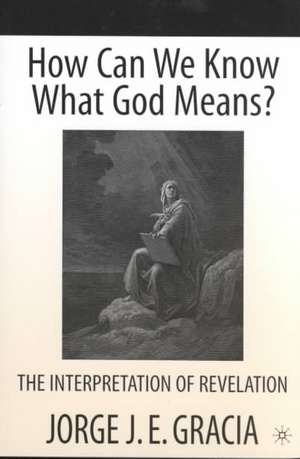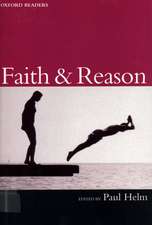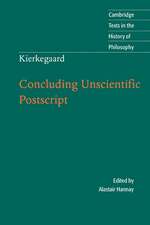How Can We Know What God Means: The Interpretation of Revelation
Autor J. Graciaen Limba Engleză Paperback – 16 oct 2001
| Toate formatele și edițiile | Preț | Express |
|---|---|---|
| Paperback (1) | 635.96 lei 6-8 săpt. | |
| Palgrave Macmillan US – 16 oct 2001 | 635.96 lei 6-8 săpt. | |
| Hardback (1) | 639.73 lei 6-8 săpt. | |
| Palgrave Macmillan US – 16 oct 2001 | 639.73 lei 6-8 săpt. |
Preț: 635.96 lei
Preț vechi: 748.20 lei
-15% Nou
Puncte Express: 954
Preț estimativ în valută:
121.69€ • 127.38$ • 101.29£
121.69€ • 127.38$ • 101.29£
Carte tipărită la comandă
Livrare economică 31 martie-14 aprilie
Preluare comenzi: 021 569.72.76
Specificații
ISBN-13: 9780312240288
ISBN-10: 0312240287
Pagini: 244
Ilustrații: XIV, 229 p.
Dimensiuni: 140 x 216 x 17 mm
Greutate: 0.3 kg
Ediția:2001
Editura: Palgrave Macmillan US
Colecția Palgrave Macmillan
Locul publicării:New York, United States
ISBN-10: 0312240287
Pagini: 244
Ilustrații: XIV, 229 p.
Dimensiuni: 140 x 216 x 17 mm
Greutate: 0.3 kg
Ediția:2001
Editura: Palgrave Macmillan US
Colecția Palgrave Macmillan
Locul publicării:New York, United States
Cuprins
Revelation Interpretation Meaning Interpretations Literary Interpretations Sociological Interpretations Theological Interpretations Definitive Interpretations Relativism in Interpretation Conclusion: How We Can Know What God Means Bibliography Index of Authors Index of Subjects
Recenzii
'...his points are cogent and well developed.' - Dianne Bergant, Catholic Biblical Quarterly
Notă biografică
JORGE J.E. GRACIA is Distinguished Professor of Philosophy at the State University of New York at Buffalo. He has authored ten books including Individuality; Philosophy and Its History; A Theory of Textuality; Metaphysics and Its Task, and Hispanic/Latino Identity, and nearly 200 articles. He has also edited over a dozen books on metaphysics, historiography, hermeneutics, medieval philosophy, and Hispanic issues. He has been President of the Society for Medieval and Renaissance Philosophy, the American Catholic Philosophical Association, the Metaphysical Society of America, and the International Federation of Latin American and Caribbean Studies.
















